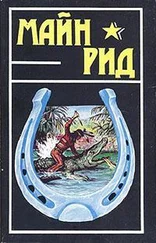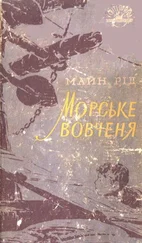“Never. After what has passed, never!”
“Ach! yoush musht not be too revengeful. Mishter Vochan ish a proud man; and I musht say he hash behaved badly – very badly; but still he ish your uncle.”
“He has not acted as such.”
“That ish true – very true – thish fine gentleman you shpeak of – shtill, that ish no reason why Mishter Vochan should treat hish own nephew so shabby. Well, well – I am sorry – exsheedingly sorry. But, Mashter Herbert,” continued the penn-keeper, interrogating his guest with evident interest, “what dosh you intend to do? I supposhe you hash monish of your own?”
“I am sorry to say, Mr Jessuron, I have not.”
“No monish at all!”
“Not a shilling,” affirmed Herbert, with a careless laugh.
“That ish bad. Where dosh you think of going – since you shay you will not return to Mount Welcome?”
“Well,” said Herbert, still preserving his air of jocularity, “I was making for the port again, when your worthy overseer and his friends intercepted me – luckily, I may say: since, but for their intervention, I should in all likelihood have gone without dinner to-day – at all events, I should not have dined so sumptuously.”
“A wretched dinner, Mashter Vochan – a misherable dinner to what your uncle could have given you. I’m but a poor humble man compared with the Cushtos; but what I hash ish at your service any time.”
“Thanks!” said Herbert. “I know not, Mr Jessuron, how I shall ever repay you for your hospitality. I must not tax it any longer, however. I see, by the sun, it is time I should be making for the Bay.”
As Herbert spoke, he was rising to take his departure.
“Shtop, shtop!” cried his host, pushing him back into his chair; “not to-night, Mashter Vochan, not thish night. I can’t promish you ash fine a bed as yoush might get at Mount Welcome, but I think I can give you a better ash you shleep in lash night – ha, ha! You musht stay with ush thish night; and Shoodith will make you some music. Don’t shay a word; I takesh no refushal.”
The offer was a tempting one; and, after some further pressure, Herbert acquiesced in it. He was partly influenced to stay where he was, by the poor prospect of a lodging which the Bay afforded him; and, perhaps, a little from a desire to hear the promised music.
The conversation was continued, by his host putting some further interrogatories: – How did Herbert intend to employ himself in the Bay? What prospect had he of employment; and in what line?
“I fear not much in any line ,” replied the young man, answering both questions in one, and in a tone of sarcastic despondence.
“Hash you no profeshion?”
“Alas, no!” replied Herbert. “It was intended by my father I should have one; but he died before my education was completed; and my college – as is too often the case – has taught me little more than a knowledge of dead languages.”
“No ushe – no ushe whatever,” rejoined the intelligent Israelite.
“I can draw a landscape,” pursued the young man, modestly, “or paint a portrait tolerably well, I believe – my father himself taught me these accomplishments.”
“Ah! Mashter Vochan, neither ish of the shlightest ushe here in Shamaica. If you could paint a house, or a waggon, or a shopkeeper’sh sign, it would bring you more monish than to make the likeneshes of every face in the island. What saysh you to the situation of book-keeper?”
“Unfortunately, I know nothing of accounts. The very useful science of book-keeping I have not been taught.”
“Ha! ha! ha!” replied Jessuron, with an encouraging chuckle, “you ish what we, in Shamaica, call green , Mashter Vochan. You musht know that a book-keeper here hash no books to keep. He doesh not even put a pen to paper.”
“How is that, Mr Jessuron? I have heard the statement before, though I did not comprehend what was meant by it.”
“Then I musht explain, Mashter Vochan. There ish a law here which makes all proprietors of shlaves keep a white man on hish estate for every fifty blacksh. A very shilly law it ish; but it ish a law. Theesh white supernumeraries are called book-keepers: though, ash I’ve told you, they keepsh no books. Now you understand what it meansh.”
“Then, what duties do they perform?”
“Oh! that depends on circumshtances. Some look after the shlaves, and some do thish and some that. But, egad! now I think of it, Mashter Vochan, I am myshelf in need of a book-keeper. I have joosh bought a new lot of blacksh, and I musht not break the law. I am ushed to give my book-keepers fifty poundsh a-year, currenshy; but if you would be content to accept such a berth, I would make the salary – on account of your uncle – a hundred poundsh a-year. You would also be found in everything elshe. What dosh you shay, Mashter Vochan?”
This unexpected proposal on the part of the penn-keeper, caused his guest to hesitate and reflect.
Not long, however. His forlorn, homeless situation presented itself too forcibly to his mind, to keep him long in doubt as to what answer he should make.
Suffice it to say, that the offer – which to the young Englishman appeared only too generous – was accepted; and from that hour the Happy Valley became his home.
Chapter 32
A Plotting Parent
Jacob Jessuron was never known to be generous without expecting some reward. Never did he fling out a sprat without the expectation of catching a salmon.
What object had he in view in thus becoming the patron and protector of the young Englishman – an outcast adventurer, apparently incapable of making him any return? Why such liberal conditions unasked, and to all appearance unmerited – for, to say the truth, Herbert Vaughan was not the stuff for a slave-driver , a term almost synonymous with that of book-keeper .
No doubt the Jew had some deep scheme; but in this, as in most other matters, he kept his counsel to himself. Even his “precious Shoodith” was but half-initiated into his designs upon this special subject: though a conversation, which occurred between father and daughter, had placed before the latter some data calculated to assist her in guessing at them.
The date of this dialogue was upon the morning after Herbert’s arrival at the penn.
“Show the young man every kindness, Shoodith dear! Don’t shpare pains to pleashe him.”
“Why particularly him , my worthy parent?”
“Hush! mine Shoodith! Shpeak low, for the luf of Gott! Don’t let him hear you talk in that shtyle. Theesh young Englishmen are not ushed to our ways. I hash a reason for being friendly to him.”
“What! because he is the nephew of Vanity Vaughan? Is that your reason, rabbi?”
“I shay, shpeak low! He’s in his shleeping room, and may hear you. A single word like that you shay might shpoil all my plans.”
“Well, father, I’ll talk in whispers, if you like. But what are your plans? You’ll let me know them, I suppose?”
“I will, Shoodith, but not shoost now. I hash an idea, mine daughter – a grand idea, it ish! And if all goes right, you, Shoodith, will be the richest woman in Shamaica.”
“Oh, I have no objection to that – to be the richest woman in Jamaica, with a prince for my footman! Who won’t envy Judith Jessuron, the daughter of the slave-merchant?”
“Shtay! a word about that, Shoodith dear. In hish presence we musht say as little ash possible upon the subject of shlaves. He musht see no shlave-whipping here – at leasht till he gets ushed to it. Ravener musht be told to behave himshelf. I knowsh of more than one young Englishmans who left his place joosh for that very thing. He needn’t go among the field handsh at all. I’ll take care of that. But, dearest Shoodith! everything depends on you; and I knowsh you can, if you will.”
Читать дальше
Конец ознакомительного отрывка
Купить книгу











